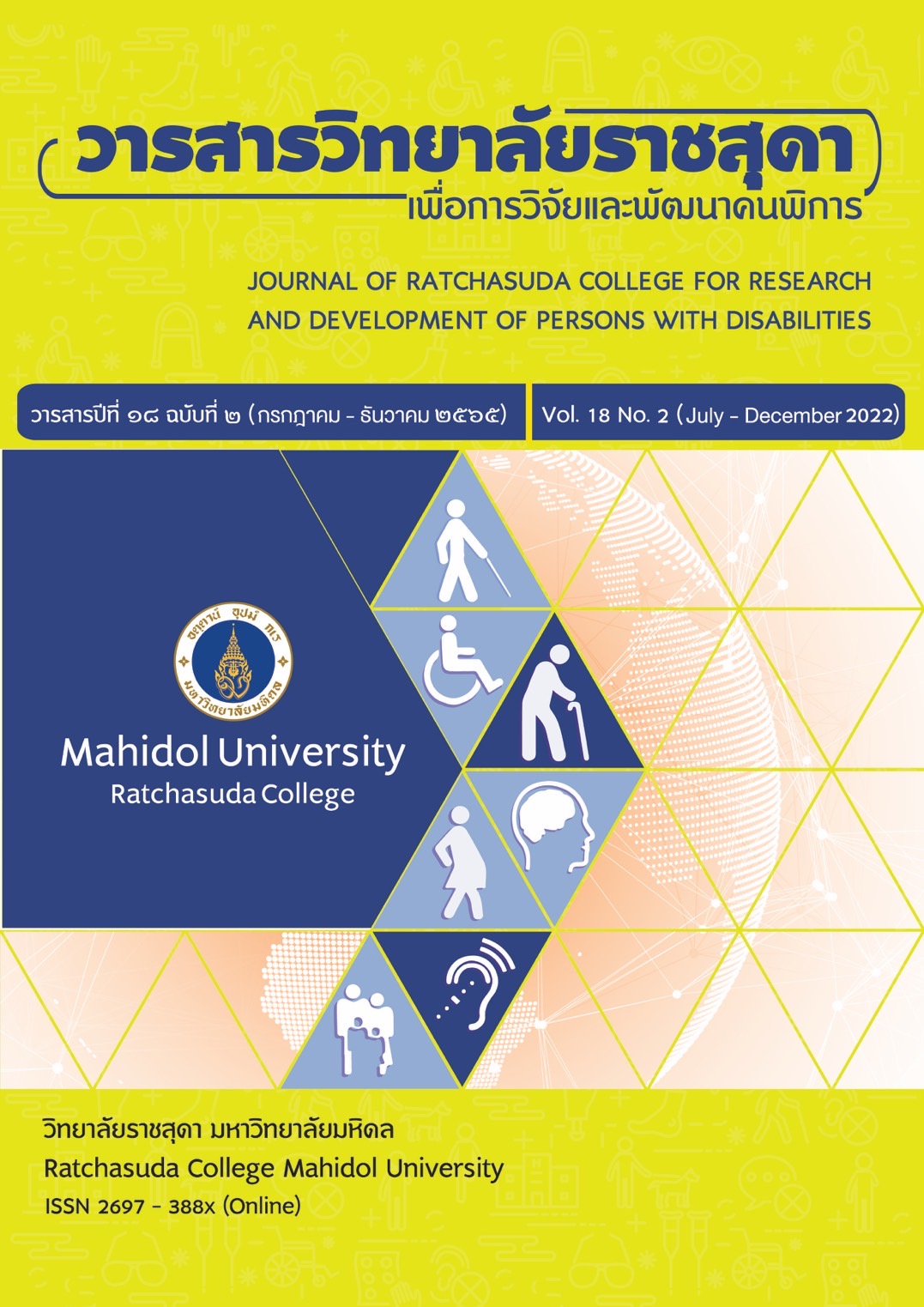Model for Development of Persons with Disabilities by Online Education Management “Northeastern region”
Keywords:
Disability Development Model, Online Education Management, Northeastern RegionAbstract
This study aimed; To study the condition and problems of education management for the development of people with disabilities in the COVID-19situation. To study the development model of people with disabilities through online education management, and assess the model for the development of people with disabilities through the provision of online education. The samples used in the study were school administrators, teachers of the disabled, caretakers of the disabled, and 280 social and human development staff, and interviewed 8 people. The using questionnaires and the interview form as a study tool. The statistics used for data analysis were frequency, percentage, mean and standard deviation. The results of the study showed that; 1) Conditions and problems of education management for the development of disabled people in the COVID-19 situation, most of them are on a large scale. 2) The development model for people with disabilities through online education was found. Management has a policy of developing the executives and personnel have supervised and followed up and encouraging personnel and related persons to share and learn about learning management through online channels of learners with disabilities to help recreation and make children with disabilities more willing to study online and improve the quality of life of children to be equal to normal children. 3) The results of the evaluation of the development model for people with disabilities through online education management found that all aspects are appropriate and useful, therefore passed the assessment criteria.
Downloads
References
Agthe, R. R. (1980). The Elementary Principals Perceptions of their own and the
TeacherRoles in Curriculum Decision Making. Dissertation Abstracts International, 40(6), 3076.
Allais, S. & Shalem, Y. (2021). The shifting powers of educational knowledge: power
relations between sociology and economics of education. Curriculum Studies Journal, 53(2), 197-211.
Apaijai, N. (2017). Education Management Model for Career Encouragement of
Disadvantaged. Students in School under Royal Initiative. (Doctoral Dissertation). Chiang Mai Rajabhat University. Chiang Mai.
Chaiyon, S. (2016). Leaders of School Administrators in the 21st century. Faculty of
Education Journal Kalasin University, 1(1), 304-306.
Connelly, S. (2007). ‘Education ain’t for us’: Using bourdieu to understand the lives of
young white working-class men classified as not in education, employment or training. Research in Post-Compulsory Education, 25(2), 193-213.
Latham, G. P. (1997). Precarious curve ahead: The effects of forced distribution rating
systems on job performance. Human Resource Management Review, 26(2), 166-179.
Maturos, S. (2021). Education to thailand 4.0 in the context of school administrations.
Rajapark Journal, 15(40), 33-42.
Ministry of Education. (2020). Policy and focus of the Ministry of Education, fiscal year
Retrieved from http://www.reo2.moe.go.th/home/index.php/login/201810- 17-08-14-28/588-2563.
Office of Nation Education Standards and Quality Assessment. (2009). Framework for
external quality assessment in higher education. Retrieved from http://www.onesqa.or.th/th/contentdownload/972/?inputFilter=&TextSearch=&CategoryPageSize =10.=159&gotoPage=1&..
Office of the Education Council. (2020). education information. Retrieved from
Phanpattanakul, S. (2011). The development of an effective school administration
model for the office Board of Basic Education. (Master’s thesis). Sripatum University, Bangkok, Thailand.
Pungbour, S. (2019). E-learning/google classroom application / E-learning achievement.
Educational Leadership and Human Resource Development, Chiang Mai Rajabhat University.
Saratana, W. (2003). Educational Administration. (4th edition). Bangkok: Thipwisut.
Thep Arak, P. (2011). Principles of educational management. Bangkok: Parbpim.
ThongPreecha, J. (2019). Teaching and learning management during Covid - 19
pandemic in Wachirathamsatit School, Phra Khanong district, Bangkok, Faculty of Education Journal Kalasin University, 3(5), 315-320.
Tiebpan, T. (2019). Tharisorn Teappan Model Development of the Academic
Administration to Enhance the Student Quality in the Charitable Schools of Buddhist Temples in Areas of Southern Provinces. (Doctoral dissertation). Hatyai University, Songkhla, Thailand.
Wangsitthidet, S. (2016). Changing Technics. Rajabhat Maha Sarakham University
Journal, 10(25), 225-228.
Williams, M. (1988) “The Effects of Cooperative Team Learning on Achievement and
Student Attitude Algebra Classroom,”. Dissertation Abstracts International. 49 (December). 3611-A.
Yamane, T. (1967). Elementary Sampling Theory, Taro Yamane: Physical Chemistry
Chemical Physics.
Downloads
Published
How to Cite
Issue
Section
License
Copyright (c) 2022 JOURNAL OF RATCHASUDA COLLEGE FOR RESEARCH AND DEVELOPMENT OF PERSONS WITH DISABILITIESบทความที่ได้รับการตีพิมพ์เป็นลิขสิทธิ์ของวารสารสถาบันราชสุดาเพื่อการวิจัยและพัฒนาคนพิการ






